

The top 10 new open source projects of the year. Finnish schools using open source reap savings. Mirror Neurons Make Our Brains Look Alike - Better Brain Better Life. By Guest Writers Pierre Bohn & Corinne Fournier As we move through our lives our brains constantly interpret the actions and intentions of others.

When we see someone pick up a stone, how do we know if it’s a threat? We also learn from others and sometimes we feel for them. How do we learn by imitation? Why do we feel empathy? The answers to these questions are found in brain research on neurons. There are many types of neurons in the brain. Giacomo Rizzolatti and his colleagues were studying brain activity in monkeys by implanting thin electrodes to take precise measurements of the brain’s electrical activity (EEG). Mirror neurons exist in the pre-motor cortex, so-called because it shows electrical activity before the motor region (which shows movement) becomes active.
Determining Intentions Let us consider a knife. Mirror neurons help to explain how we learn. There have been many studies of mirror neurons on humans. Mirror neurons also provide an understanding and sharing of emotions. Why the world needs OpenStreetMap. Every time I tell someone about OpenStreetMap, they inevitably ask "Why not use Google Maps?
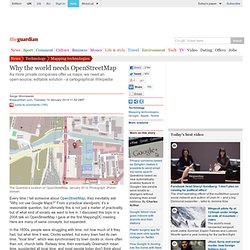
" From a practical standpoint, it's a reasonable question, but ultimately this is not just a matter of practicality, but of what kind of society we want to live in. I discussed this topic in a 2008 talk on OpenStreetMap I gave at the first MappingDC meeting. It Was Never About Innovation. By johnmark on November 27, 2013 This is the first in a series of articles about innovation and open computing.
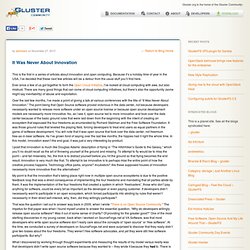
Because it’s a holiday time of year in the USA, I’ve decided that these next few articles will be a detour from the usual stuff you’ll find here. Ever since a few of us got together to form the Open Cloud Initiative, I’ve looked at cloud computing with awe, but also mistrust. Court: Open Source Project Liable For 3rd Party DRM-Busting Coding.
A judgment handed down by a German court against an open source software project is being described as "worrisome" by the company at the heart of the case.
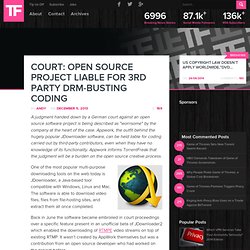
Appwork, the outfit behind the hugely popular JDownloader software, can be held liable for coding carried out by third-party contributors, even when they have no knowledge of its functionality. Appwork informs TorrentFreak that the judgment will be a burden on the open source creative process. One of the most popular multi-purpose downloading tools on the web today is JDownloader, a Java-based tool compatible with Windows, Linux and Mac. The software is able to download video files, files from file-hosting sites, and extract them all once completed. À propos de ReactOS. ReactOS® is an effort to create a Free and Open Source replacement for the Microsoft Windows NT® family that is compatible with both applications and drivers.
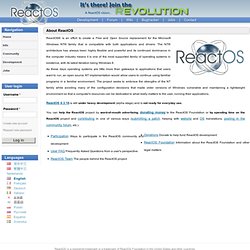
The NT® architecture has always been highly flexible and powerful and its continued dominance in the computer industry means it is one of the most supported family of operating systems in existence, with its latest iteration being Windows 8. As these days operating systems are little more than gateways to applications that users want to run, an open source NT implementation would allow users to continue using familiar programs in a familiar environment. The project seeks to embrace the strengths of the NT family while avoiding many of the configuration decisions that made older versions of Windows vulnerable and maintaining a lightweight environment so that a computer's resources can be dedicated to what really matters to the user, running their applications.
M2M and the Internet of Things: A guide. Linux Foundation adopts Open Virtualization Alliance and KVM. In Edinburgh, Scotland at the European LinuxCon the Linux Foundation announced that the Open Virtualization Alliance (OVA) is becoming a Linux Foundation Collaborative Project.
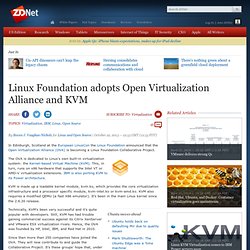
The OVA is dedicated to Linux's own built-in virtualization system: the Kernel-based Virtual Machine (KVM). This, in turn, runs on x86 hardware that supports the Intel VT or AMD-V virtualization extensions. IBM is also porting KVM to its Power architecture. KVM is made up a loadable kernel module, kvm.ko, which provides the core virtualization infrastructure and a processor specific module, kvm-intel.ko or kvm-amd.ko. KVM also requires a modified QEMU (a fast X86 emulator). Technically, KVM's been very successful and it's quite popular with developers. OpenStack Havana: Open-source cloud for the enterprise. Businesses have taken to OpenStack, the open-source, Infrastructure-as-a-Service (IaaS) cloud, like ducks to water.
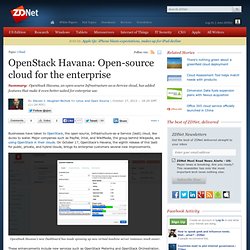
Major companies such as PayPal, Intel, and WikiMedia, the group behind Wikipedia, are using OpenStack in their clouds. On October 17, OpenStack's Havana, the eighth release of this IaaS for public, private, and hybrid clouds, brings its enterprise customers several new improvements. These enhancements include new services such as OpenStack Metering and OpenStack Orchestration. When combined with improvements to existing services, such as global clusters for Object Storage and Quality of Service (QoS) capabilities for Block Storage, these make OpenStack even better for organizations that are building or deploying applications on clouds.
10 Great Podcasts for Linux & Open Source Geeks.
Théorie. Open source web. Reseaux sociaux. Open Hardware. Sources d'information principales. Politique et économique open source. Libération du logiciel.